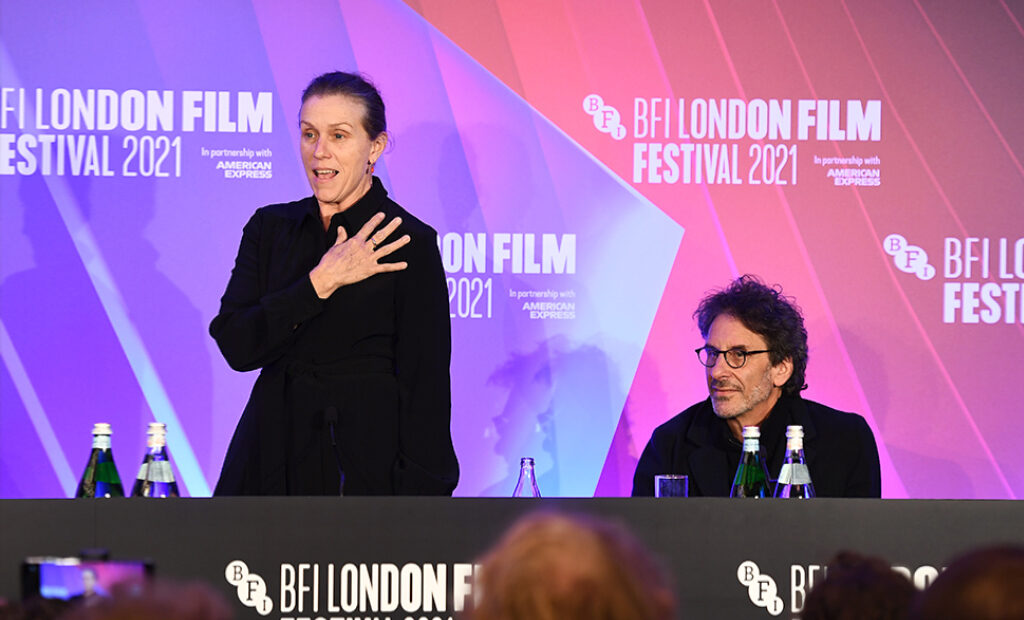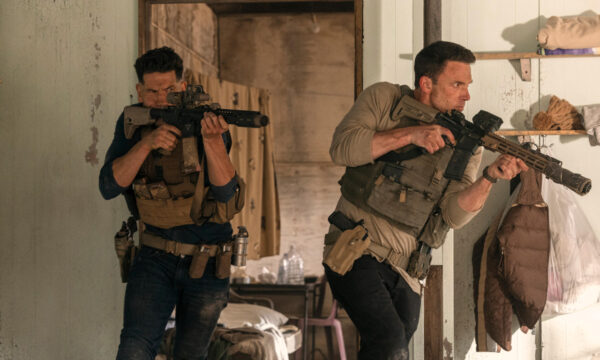The Tragedy of Macbeth press conference: Joel Coen and Frances McDormand at the London Film Festival 2021

The Tragedy of Macbeth is Joel Coen’s first solo directing gig minus his brother Ethan. Shot in eerie black-and-white, it’s a stripped-back invocation of the Bard’s ever fascinating text. At its centre are Denzel Washington and Coen’s real-life partner, the one-and-only Frances McDormand, as Macbeth and Lady Macbeth respectively.
The Upcoming had the pleasure of hearing from the director and his cast – Frances McDormand, Harry Melling, Bertie Carvel, Corey Hawkins, Kathryn Hunter and Alex Hassell – plus cinematographer Bruno Delbonnel at the movie’s press conference at the BFI London Film Festival 2021.
Coen shared whether he felt adapting the Shakespeare play for the big screen was a departure for him, in terms of the types of films he has worked on previously: “It is interesting how much of the play prefigures 20th century American noir tropes, both in movies and in literature – you know, it’s a couple plotting a murder. So I guess in that respect it wasn’t foreign territory but pretty much in every other respect it was way out of my wheelhouse, if you subtract the genre expectations of the piece.”
McDormand spoke about how she came to work on the project with Coen, having wanted him to direct a version of the play for a long time: “For years I would ask you, right? Then there was one point I was working with a theatre director (whose name will not be mentioned), who I said to, ‘I really want Joel to do Macbeth with me on the stage.’ And he said, ‘Maybe you should let him start with something a little simpler.’ And I think that’s why we’re here today. You don’t hold Joel back.”
Cinematographer Delbonnel explained how they came to shoot in black-and-white: “When we started three years ago, more or less, it was about the language and I thought colour would have been obstructive in some ways; and there was an idea that the image could shouldn’t conflict with the language it was just to say, ‘Okay, Shakespeare’s first’ – even if it’s untranslatable in French – but it was really about the language. So it was all about this: how can we show something where the language is there more than the image in some ways? So it becomes very abstract.”
Carvel, who plays Banquo, spoke about the rehearsal period they had prior to filming: “I feel like it was six weeks but I think I heard you say it was only three? In any case, that’s a king’s luxury in this world, to be able to actually rehearse at all. And, certainly, Joel and Frances brought us together as a company and in a way that is much more of the theatre than, certainly in my experience, is the case in film and television. So just to be able to share ideas, marinate in the play, start to have some kind of a process – but I have to say that it was a hybrid process, right? Because I guess Joel rehearsing plays is not what you do. So that was a departure for you, and rehearsing film in that way is certainly not something I’ve done before, so I think we all had to learn from the ground up what that process was.”
Melling, who plays Malcolm, added: “And we knew exactly what we were in, which I think was so important. We knew the rules of engagement from an acting perspective – the language. I think was very much born from those three weeks in that room together.”
Portraying Macduff, Hawkins shared what it was like returning to Shakespeare after making his debut as Tybalt in Romeo and Juliet: “First of all, I just counted myself really lucky to be able to come back to the Bard’s language. But, at the end of the day, I think it just goes back to what everyone’s saying – a lot of times people say you have to work the text, but a lot of this process was just allowing the text to work and getting out of the way of it. And again, it’s about knowing the rules of engagement, knowing the world that you’re stepping into and allowing that space. And this film, this play, is all about those contrasts – there is the contrast of black and white, there’s the contrast of good and evil, there’s the contrast of fate and choice. But the black-and-white of it all allows us to kind of step in there, in the middle somewhere, and fill it with all of these unique characters and choices. It’s the same language, whether you’re on stage or on film. That was the fun of being in that room for three weeks – it did feel like a little bit more than three weeks! – I just remember we were in the room literally reading each other’s lines. It was just really understanding the text from this perspective, from that perspective, just attacking it in all different ways and throwing it out and then bringing it back and just playing. And that allows the audience to then come to this film and relate in a way that sometimes I don’t normally relate to Shakespeare on film.”
Hassell spoke about how he and Coen adapted his character of Ross for this adaptation: “I knew the play quite well and when I found out I was auditioning for and then getting the part of Ross, I was like ‘That’s cool I’m really excited about that.’ And I then read the script and realise this is much more than I had expected! It was a real gift and I think in terms of an audience coming to the film – obviously there’s a great familiarity with the play, and the story of the play, and the characters in the play – so I think to have a character that is very unknowable and unknown, and a mystery creates a different layer of tension, which I think is really interesting for me as an actor. Joel was very collaborative in general and I would think that everyone would agree that he’s very collaborative. But when I turned up in LA to do the part, I had no idea at all how I should play the part. So it was really useful to get to talk with Joel a great deal. I don’t know think we talked that much about his agenda, it was more about how he might come across. I tried to think quite dramaturgically about each scene: what is new that the audience might find out in this scene or the next scene or the next scene? How can we sort of throw them off the scent? That was idea was for me anyway.”
And Hunter, who plays all three of the witches, reflected on the way Coen decided to use soundstages, rather than film on location in Scotland: “Just going back to the Scotland thing – when Joel and Frances showed me some mood boards and everything, I had been working with the director called Peter Brooke who had introduced me to Edward Gordon Craig, who famously and extraordinarily created screens, rather than realism, rather than naturalistic sets. And he said about Shakespeare for years, ‘We’ve been getting in the way and spoiling Shakespeare by doing rooms and castles and everything.’ He says, ‘If you find an idiom that is close to dream, then you’re getting near.'”
Sarah Bradbury
Video: Filippo L’Astorina
Photo: Getty Images
The Tragedy of Macbeth is released in select cinemas on 17th October 2021. Read our review here.
Read more reviews and interviews from our London Film Festival 2021 coverage here.
For further information about the festival visit the official BFI website here.
Watch the trailer for The Tragedy of Macbeth here:























Facebook
Twitter
Instagram
YouTube
RSS